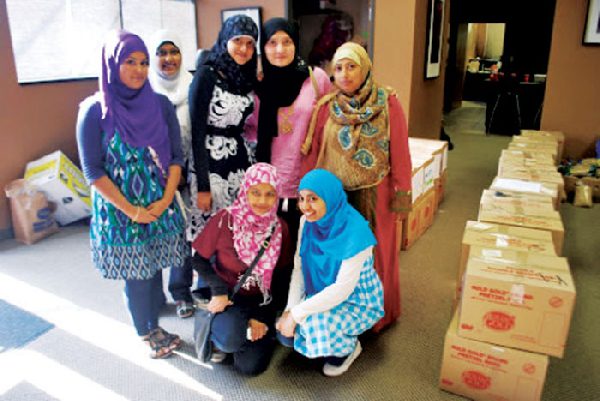
|
| Young Muslim women partnering with Zaman International to provide struggling families throughout metro-Detroit with meals. |
DEARBORN — American Muslims have made great contributions to society. However, their philanthropic efforts are often overlooked by the media.
There is widespread misconception that Arab and Muslim Americans don’t contribute enough to society. Dave Agema, the chairman of the Michigan Republican Party, fueled the stereotype and made headlines last year when he questioned the contributions of American Muslims to society. In a Facebook post Agema said, “Have you ever seen a Muslim do anything that contributes positively to the American way of life?”
“People like Dave Agema need to educate themselves about Muslims and Islam,” said Hussein Hachem, founder of the Lebanese American Heritage Club’s Youth Leadership Committee (LAHC-YLC). “Our holy book, the Quran, says we have to help feed the poor and the needy. The Quran tells us to give as much as we can. It basically says you have to give to others if they need food, clothes and shelter.”
Zakat, the third pillar of Islam, is a mandatory process for Muslims. Zakat is almsgiving for the relief of the poor. It is a religious obligation Muslim Americans are very serious about fulfilling, including the hundreds of thousands here in metro-Detroit.
“Zakat says you have to take care of your neighbor regardless of race, color or religion,” Hachem said.
Last year, Islamic Relief USA and the Michigan Muslim Community Council (MMCC) donated a combined $100,000 to the Detroit Water Fund and the Wayne Metropolitan Community Action Agency to help Detroiters pay their water bills. Thousands of Detroiters were affected when the city shut off water for residents with overdue balances.
Victor Begg, a member of the MMCC, said part of the group’s mission is to help improve the development of the state.
“We are committed to bettering the state, Begg said. “We focus on Detroit in particular.”
The Huda Clinic of Detroit recently commemorated its 10-year anniversary. The clinic provides health care services to the needy and serves a large African American population in Detroit.
The clinic is funded by the Muslim community. Its biggest funder is the Islamic Association of Greater Detroit.
“We serve the uninsured every day. It doesn’t matter what creed, color or race,” Huda Clinic Vice chairman Mitchell Shamsud-Din said. “We are glad folks who don’t have insurance can get help. We are proud we can supply those services.”
Hachem said the Youth Leadership Committee gives young Muslims the opportunity to meet their religious charitable obligations.
The group’s year-round philanthropic efforts often focus on charitable work outside the Muslim community.
Every year during the holy month of Ramadan the group collects canned goods, clothing and other items for the needy and donates them to the Salvation Army.
In December, the LAHC served more than 200 warm meals to needy families in metro Detroit at the Neighborhood Service Organization.
“We had somebody dress as Santa and a few people dressed as elves to make the children happy,” Hachem said of the group’s visit to the McDonald Center of Detroit last year. The Center helps treat critically ill children.
The group also has a strong partnership with the Prayer Time Tabernacle church in Detroit, where it frequently feeds the homeless.
“We are Muslims and we go to the church in Detroit during Thanksgiving,” he said. “We always go there and distribute food to the needy.”
There are several other local Muslims and Dearborn-based individuals and organizations that are helping improve society through charitable work, including the Muslim businessman who chose to remain anonymous when he rented an entire hotel one winter to house Detroit’s homeless; the Islamic Center of America, which recently held an event where people wrapped gifts for the homeless to celebrate the prophet’s birthday and the charitable group Life for Relief and Development that partnered with Sharjah Charity International to provide free meals every night throughout the holy month of Ramadan, among several others.
The Dearborn Zaman International has two trucks that roam Metro Detroit to collect and distribute donations. Zaman also distributes leftovers from local restaurants, bakeries and grocery stores to people in need. According to the organization’s website, the Mobile Food Pantry Program has delivered 319,029 pounds of hot meals over the years.
Noor Hassan of the Dearborn-based Al Mabarrat charity, a non-profit that focuses on helping orphans from Iraq and Syria, said when Muslims come into the office to fulfill their charitable religious obligations by making a donation, they never ask about the religion or background of the orphans.
“We don’t specify what the religion of the child is,” Hassan said “And donors who want to fulfill the charitable work, they are required to by God to never ask either. They just say make sure this goes to somebody who is needy. It just has to go to a poor person, a person in need. Islam is for everybody and all humanity.”






Leave a Reply